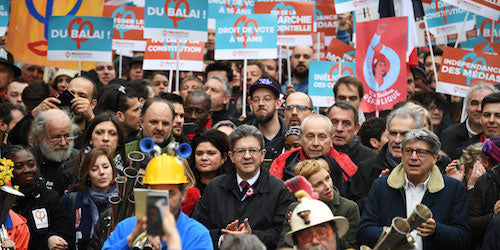The desire for a leader

Sophie Wahnich's reflection on the first round of the French presidential election was first published in L’Obs on 27 April. 
What I take from the campaign and the result on 23 April is French people’s increasingly powerful desire for a leader. The three figures who dominated the debates expressed this same aspiration: Marine Le Pen, of course, but also Emmanuel Macron, acting solo against the parties, and finally Jean-Luc Mélenchon, even if he claims not to be doing so.
This aspiration to be led by a powerful incarnating figure is a worrying one. For the people crying out for this are often the same ones who often refuse themselves to engage in the invention of the society of tomorrow. The desire for a leader often goes hand-in-hand with a refusal to take responsibility. Certainly, the presidential election encourages this. In my view, this desire is a symptom of the present day world, and is not specific to France.
In this context, Jean-Luc Mélenchon offers the most interesting case, for he tries to reconcile the need for democratic horizontality with a vertical conception of politics. The France Insoumise candidate offered a "tribune" version of this verticality. He revived the imaginary of great popular tribunes like Jean Jaurès. Since I am not his psychoanalyst, I do not have to ask myself whether he is inhabited by a desire for personal power. To me it seems that, being an intelligent man, he has understood that in order to carry forth his political project he had to give it an incarnation, a verticality. But I also see that he has taken care to contain anything that might look like a cult of his own person. He probably does have the capacities to be a tribune; but I do not believe that he enjoys holding power over the crowd.
Moreover, at the same time as he focused passions on his own person, he set up France Insoumise, which functioned in a really horizontal fashion, bringing about the emergence of new figures — even if that did not happen in the same way everywhere. Fundamentally, Mélenchon has proven able to articulate verticality and horizontality, which is the only way to construct a political power relation. Left-wing militants reject political parties, and they are right to do so. But sometimes they end up believing that we can do without any organisation. That is what happened to Nuit debout. The 19% [who voted for] France Insoumise show us that we can always invent new political forms, for each election and depending on each context. Making the Left a sort of cooperative, capable of allowing all sensibilities to thrive while at the same time coordinating them, is the only way to offer an alternative meeting the "desire for a Left."